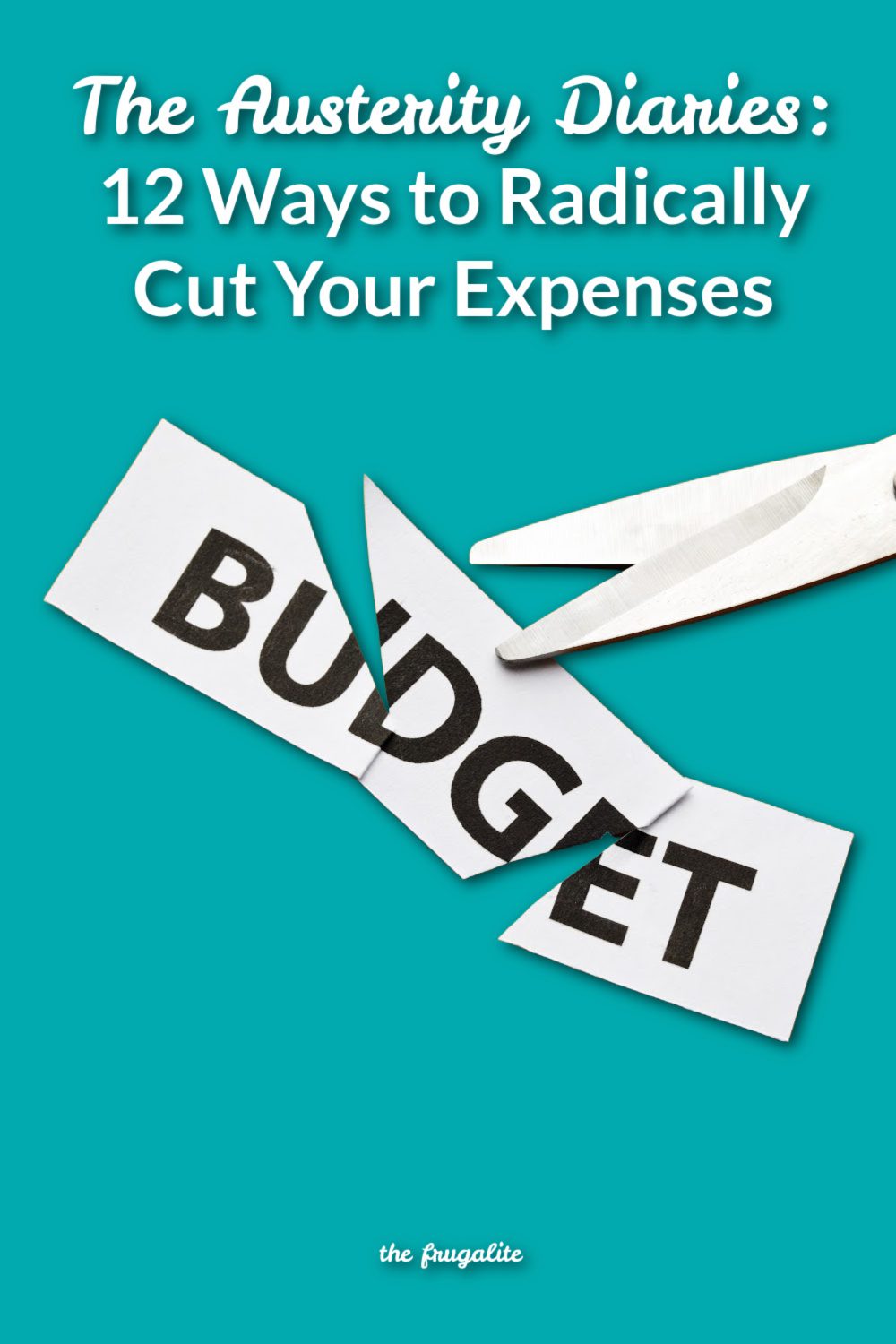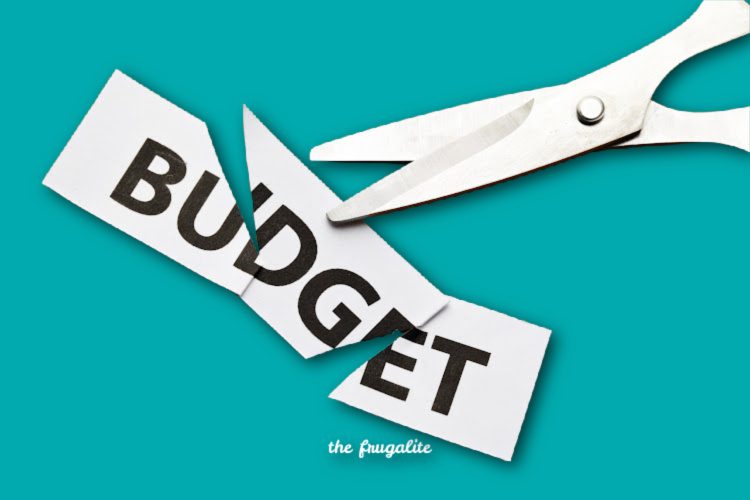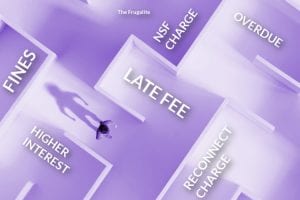(Psst: The FTC wants me to remind you that this website contains affiliate links. That means if you make a purchase from a link you click on, I might receive a small commission. This does not increase the price you’ll pay for that item nor does it decrease the awesomeness of the item. ~ Daisy)
(Originally published at TheOrganicPrepper.com in 2013.) How often do you hear people talk about how they would live their dreams if they only had a bit more money? People always dream about moving to a remote area or about staying home with the kids or about relocating to the bug-out location, but often feel that these things are financially unreachable. Do you do this yourself?
If so, then maybe it’s time to take a good hard look at your finances and enact a personal austerity plan to radically cut expenses. Most people would be surprised at the changes that can be made when they rethink the definition of the word “necessities”.
aus·tere
[aw-steer]adjective1.severe in manner or appearance; uncompromising; strict; forbidding.2.rigorously self-disciplined and severely moral; ascetic; abstinent.grave; sober; solemn; serious.4.without excess, luxury, or ease; limited; severe.5.severely simple; without ornament ; lacking softness; hard
With the gloomy economic forecast, it’s not reasonable or rational to expect things to improve in the near future. If you want to be somewhat immune to the financial difficulties coming down the pipe, you need to perform a financial makeover to pare down the monthly output to the bare minimum.
Does this sound kind of grim? It’s not – decreasing your monthly output provides a different kind of safety net. You can end (or at least reduce) your slavery to the system, where the government helps itself to at least 30% of your paycheck through payroll deductions. With your newfound freedom, you may discover that you have the money to start a business, relocate, or cut back your work hours to spend more time doing the important things in life.
Devastating financial changes are coming to a location near you. Wouldn’t you prefer to make the cuts now and adjust accordingly, instead of having them forced upon you through evictions, foreclosures, repossessions, and other painful methods?
Redefining necessities
If your finances are out of control, the best possible reality check is a stark look at what necessities really are. It is not necessary to life to have an iPhone, a vehicle in both stalls of your two-car garage, or for your children to all have separate bedrooms. People in Venezuela and parts of Europe will tell you, as they scramble for food, basic over the counter medications like aspirin, and shelter, that “necessities” are those things essential to life:
- Water
- Food (and the ability to cook it)
- Medicine and medical supplies
- Basic hygiene supplies
- Shelter (including sanitation, lights, heat)
- Simple tools
- Seeds
- Defense Items
Absolutely everything above those basic necessities is a luxury.
So, by this definition, what luxuries do you have?
Some are more important than others, based on your lifestyle and might be considered secondary necessities. You might require transportation, work clothing, a computer and an internet connection, electrical appliances, a cell phone – you are the only person who can define which are these are luxuries and which are secondary necessities. It’s essential to be truly honest with yourself and separate “wants” and “I really enjoy having this” and “the kids will complain without it” from “needs”
For example, I am a freelance writer who lives in a remote area. Without an internet connection and a laptop, I have no work. For me to make a living, therefore, my computer and monthly internet bill are a necessity. However, because I work from home, a fashionable work wardrobe is not important to me. I can wear jeans and a t-shirt to work every single day, and it won’t affect my career at all. If you have to go out to a job in customer service, for example, then perhaps a computer and internet connection would be less important than a good-looking career wardrobe.
My personal austerity plan
A couple of years ago, I began to see the writing on the wall for my own personal finances. I’m a single mom and my former husband is deceased, so there is no child support coming in. So as far as raising these children goes, I’m the only game in town. I realized that the industry I had been working in for many years was very shaky (automotive) and that I’d better get my financial house in order.
I began to cut expenses as quickly as possible. I was making a very good income and our lifestyle had “improved” with each pay raise and promotion. Although these changes were not incredibly popular with the kiddos, I made them ruthlessly. I made the following adjustments:
- Moved from a 4 bedroom home to a small 2 bedroom
- Cut cable and home phone
- Began providing a limited budget to the kids for school clothes, winter coats, and holiday gifts. If something “better” was wanted, the difference had to be earned
- Made the kids do extra chores for privileges like field trips, vacations, and houseguests
- Began cooking entirely from scratch and limiting meals out to birthdays or long trips
- Got rid of the current model year car and got an older, more affordable vehicle
- Began gardening, preserving bulk foods, and shopping through mail order sources
These efforts paid off within a few months, because my prediction was right – I got downsized. Had my expenses been at their former level, we would have struggled to keep the electricity on and food in the cupboards.
When I lost my job, I began looking for ways to make money from home. I was fortunate and picked up some freelance jobs pretty shortly, but I realized that I couldn’t make ends meet with what I was making, at least not in my then-current location.
So, I began a search for a less expensive place to live. The beauty of what I do for a living is that I can live anywhere – I only require a reliable connection to the internet. Within a few months, we’d located a very distant, very remote little cabin in the North Woods. We sold a bunch of stuff and then packed up the rest and moved 7 hours north to the boondocks, a move that saved over $1100 per month when compared to city life.
Get a picture of where you are, right now.
I realize that the changes I made are not changes that will work for everybody. I’m not suggesting the changes are a whole lot of fun either. Adjusting your own situation requires a brutal analysis of your expenditures. If you can’t get your partner or spouse on board, it’s all but impossible to do a complete overhaul. Kids, however, have to deal with it – expect loud complaints but be firm.

Print off your bank account statements for the past 2 months. On a piece of paper, track where your money is going. List the following
- Rent/Mortgage
- Utilities
- Car payments
- Vehicle operating expenses (fuel, repairs)
- Insurances
- Credit card and other debt payments
- Telephone/Cell phone
- Cable/Satellite
- Internet
- Extracurricular activities for the kids
- Extracurricular activities for the adults
- Dining out
- Groceries
- School expenses
- Clothing
- Recreational spending
- Gifts
- Miscellaneous (anything that doesn’t fall into the above categories gets it’s own category or goes here)
Don’t say to yourself, “Well, I usually don’t spend $400 on clothing so that isn’t realistic.” If you spent it, then it’s realistic. You are averaging together two months, which should account for those less common expenses. Brutal honesty isn’t fun, but it’s vital for this exercise.
So….what do you see when you look at your piece of paper with your average monthly expenditures for the past two months? Are there any surprises? Did you actually realize how much you’ve been spending?
It can’t continue like this. The economy will not withstand it. Step one is to see where you can cut things out right now from the above expenditures. Can you reduce your grocery bill? Slash meals out? Budget more carefully for gift-giving and school clothes?
Design a plan to radically cut expenses.
Step two – this is where the brutal cuts come in. What can you change about your life? Where can you reduce expenditures by several hundred dollars monthly? This is the point at which most people say, “I can’t.” Most people don’t want to move to a smaller house, get an old car, or go without premium cable. But this is where you can truly dig in and change your life.
As I said before, everyone’s situation is different. You may be locked into a mortgage on a huge house in a market that won’t even cover the balance of what you owe. It could be the same with your vehicle. Explore all of your options, though, because paying a few thousand dollars to get out from under it could be worthwhile. Some people could have reached the point where they must begin to default on payments. That too, is a personal choice. I’m not recommending that you blow off your obligations. (However, do consider the fact that large banks get bailed out by the government, and everyday people do not.) Before making decisions like that, be sure to discover all of the potential ramifications, such as repossessions, garnishing of bank accounts, and ruined credit.
Here are some cuts to consider:
- Move to a smaller house. Contrary to popular belief, no child ever died because he or she had to share a room with a sibling.
- Relocate to a small town. Is it worthwhile to commute to a job in the city from a smaller, less expensive location? This can give you the added opportunity of homesteading and providing for many of your own needs. Click HERE to read about what you need to know before making such a move.
- Get rid of your late model year vehicle. Look for a decent used vehicle that you can purchase with cash.
- Cut back to one vehicle or even no vehicles. Sometimes public transit and your own two feet can provide all of the transportation you really need at a fraction of the price of owning a vehicle. This varies by location.
- Stop using credit cards. This goes for any type of lending system that requires you to pay interest. Stop accumulating debt.
- Don’t eat out. Limit meals out to no more than once a month or special occasions. Even better, don’t eat out at all. Dining out, even at a fast food place, is at minimum 4 times more expensive than the same meal prepared from scratch at home. (And far less healthy!)
- Look for free or low cost entertainment. Consider a family YMCA or community center membership instead of gymnastics clubs or private tennis lessons if you need to enroll your kids in some activities. Go hiking, have picnics, explore parks, go to the library, and find out what’s offered for free in your home town. Learn to enjoy productive hobbies like canning, carving and needlework. Switch from cable to Netflix.
- Use the envelope method to budget for shopping trips. For back-to-school shopping or Christmas shopping, decide how much you want to spend. Put that money in an envelope. As you shop, place each receipt in the envelope. When the money is gone, it’s gone. If there’s something else your child desperately wants, then they need to decide what item they’d like to take back to get it. Be firm and stick to your guns. This has the added benefit of teaching your children to budget.
- Reduce your monthly payments by cutting things like cable, cell phones, home phones, and/or gym memberships. Look at every single monthly payment that comes out of your bank account and slash relentlessly.
- Shop using the stockpile method. Shop only the sales and simply replenish your stockpile. Keep shelf-stable food on hand for unexpected financial crunches.
- Eat leftovers. Have you ever stopped to think about how much food you throw out every month? You can often provide a few “freebies” every month by carefully repurposing your leftovers.
- Stay home. By spending more time at home, you will spend less money. You won’t be grabbing a bottle of water, going through drive-thru for lunch or putting fuel in the car. Learn to treasure you time at home with loved ones – it’s worth more than money.
This is not a comprehensive list – when you look at your personal expenditures, other ideas will present themselves.
Why now?
Why is it so important to make these changes?

Because if you don’t change your way of life, the government will. A job loss will. Inflation will.
Realistically speaking, the way things are going, none of us is likely to get a hefty raise. We’ll be lucky to keep the incomes we have. But expenses are only going to go up. To keep the true necessities within reach, we need to reduce our expenditures and put away emergency funds and stockpiles.
Personal bank accounts are being plundered across Europe. People are not just living paycheck to paycheck – there ARE no more paychecks. They’re living hand to mouth, hunting and gathering what they can in order to stay fed.
Making some difficult changes now can provide a stable standard of living in a world that is going downhill at breakneck speed. By decreasing your monthly output, you can hang on to necessities. I’d rather choose my own austerity plan than to have it forced upon me.
About Daisy
Daisy Luther is a coffee-swigging, adventure-seeking, globe-trotting blogger. She is the founder and publisher of three websites. 1) The Organic Prepper, which is about current events, preparedness, self-reliance, and the pursuit of liberty; 2) The Frugalite, a website with thrifty tips and solutions to help people get a handle on their personal finances without feeling deprived; and 3) PreppersDailyNews.com, an aggregate site where you can find links to all the most important news for those who wish to be prepared. Her work is widely republished across alternative media and she has appeared in many interviews.
Daisy is the best-selling author of 5 traditionally published books, 12 self-published books, and runs a small digital publishing company with PDF guides, printables, and courses at SelfRelianceand Survival.com You can find her on Facebook, Pinterest, Gab, MeWe, Parler, Instagram, and Twitter.












2 thoughts on “12 Ways to Radically Cut Your Expenses”
I have a different perspective on credit cards. If you always pay off the complete balance each month, you won’t have to pay a dime worth of interest (although there may be a flat fee depending on whether you do that payoff by check, cash or EFT (electronic funds transfer) over the phone. And credit cards have some other advantages. If your credit card gets hacked for instance (one example might be from a bad guy’s skimmer circuit card slipped into a gas station pump where you do business), you have a much better chance under the law for getting your stolen funds recovered — UNLIKE a similar loss from a debit card.
Another advantage is that many online sellers (of great importance to you) display ordering software that only cooperates with credit (and sometimes debit) cards — leaving you out in the cold if you only deal in checks or cash.
Some online sellers deal in products or information on a subscription basis, and often make it very inconvenient for you to discontinue such relationships by using automatic renewals that requires you to keep extremely accurate records and monitor them closely. To keep from being ensnarled in such costly automatic renewal traps, you can use the services of privacy.com to generate substitute charge card numbers for the initial purchase for either one time or multiple times use, and only for use by one or selected sellers.
Not only can that save you from the automatic renewal trap, by limiting such a substitute card number to a (or multiple) specific seller(s), it protects you from getting hacked since you have pre-limited the substitute card number’s use to your single (or your specific list of) seller(s) — which would not include any hackers.
If you should then discover that you genuinely want to get on that renewal bandwagon with selected sellers, you can always replace that single use substitute card number with a different substitute card number set up for repeated uses.
Another perspective on keeping expenses under control is to understand how the purchasing power of your US money is being regularly stolen ever since 1913 by the Federal Reserve for the benefit of the US government, the stockholders of the Fed, and their closest oligarch buddies who typically get first crack at newly printed (or digitally created) money (unbacked by precious metals or commodities) before such new money has a chance to push up prices for the rest of the population — politically sanitized by the label of inflation to cover over the theft of your purchasing power. Such theft of purchasing power for centuries was called counterfeiting … and partly because sometimes the consequences meant starvation … a death penalty was often imposed, such as in the US 1792 Coinage Act that created the US Mint.
One of the simplest examples of such price increases is the rise in gasoline prices since the 1960s when 30 cents per gallon was common. Today it’s common to see $6 to $7 prices as a prelude to $10+ prices as some west coast gas station pumps are being rebuilt to display.
So how can you minimize that loss of purchasing power of your money? Obviously you still have to use it to pay your regular monthly bills and occasional emergencies. Beyond that … is there a way to preserve the purchasing power of the rest of your funds in some way the Fed can’t counterfeit? The answer is yes! Until (or if) you learn how to preserve such funds in either a business where you can raise prices as needed OR invest such funds in other people’s businesses that can similarly thrive, you can preserve purchasing power by using glintpay.com — a UK-based company with vaults of gold in Switzerland. You can purchase an interest in such deposits and access that purchasing power as needed via an international Mastercard (at least in the US).
The advantage of preserving such purchasing power that way (instead of earning a pitifully inadequate 1-2% US bank deposit interest rate) should be apparent.
–Lewis
I have one credit card that I pay off each month. My plan has bonus points that I can use to reduce the balance, so it’s like purchasing stuff on sale. I only charge gas and one streaming service.
My big fault was clothes. I always spent lots and lots of money, buying new clothes lavishly each season. My children also dressed well. When I retired, my church was having a rummage sale. I had donated three big bags of dressy clothes. A widow with 5 children came in looking for work clothes as she was hired to work in a law firm. She was just my size! We gave her as much as she needed for next to nothing. God works always in our lives. Now I just shop second hand thrift stores when I need something.